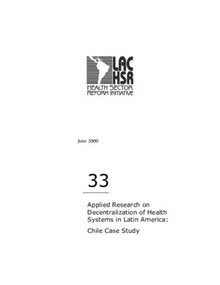Applied Research on Decentralization of Health Systems in Latin America: Chile

|
In the last two decades, health sector decentralization policies have been implemented on a broad scale throughout the developing world. Decentralization, often in combination with health finance reform, has been touted as a key means of improving health sector performance and promoting social and economic development (World Bank 1993). The preliminary data from the field, however, indicate that results have been mixed, at best. In some cases, these limitations have resulted in a backlash against the reforms and an initiative for recentralization. We believe that this rejection is often premature or misplaced and that the issue at hand is how to better adapt decentralization policies to achieve national health policy objectives. In this context, it becomes increasingly important adequately to understand the dynamics of health sector reform processes in diverse contexts, to draw both general and case-specific lessons, and to formulate effective strategies for future research and policymaking. |
